Tarun Suresh
SweRank+: Multilingual, Multi-Turn Code Ranking for Software Issue Localization
Dec 23, 2025Abstract:Maintaining large-scale, multilingual codebases hinges on accurately localizing issues, which requires mapping natural-language error descriptions to the relevant functions that need to be modified. However, existing ranking approaches are often Python-centric and perform a single-pass search over the codebase. This work introduces SweRank+, a framework that couples SweRankMulti, a cross-lingual code ranking tool, with SweRankAgent, an agentic search setup, for iterative, multi-turn reasoning over the code repository. SweRankMulti comprises a code embedding retriever and a listwise LLM reranker, and is trained using a carefully curated large-scale issue localization dataset spanning multiple popular programming languages. SweRankAgent adopts an agentic search loop that moves beyond single-shot localization with a memory buffer to reason and accumulate relevant localization candidates over multiple turns. Our experiments on issue localization benchmarks spanning various languages demonstrate new state-of-the-art performance with SweRankMulti, while SweRankAgent further improves localization over single-pass ranking.
DINGO: Constrained Inference for Diffusion LLMs
May 29, 2025Abstract:Diffusion LLMs have emerged as a promising alternative to conventional autoregressive LLMs, offering significant potential for improved runtime efficiency. However, existing diffusion models lack the ability to provably enforce user-specified formal constraints, such as regular expressions, which makes them unreliable for tasks that require structured outputs, such as fixed-schema JSON generation. Unlike autoregressive models that generate tokens sequentially, diffusion LLMs predict a block of tokens in parallel. This parallelism makes traditional constrained decoding algorithms, which are designed for sequential token prediction, ineffective at preserving the true output distribution. To address this limitation, we propose DINGO, a dynamic programming-based constrained decoding strategy that is both efficient and provably distribution-preserving. DINGO enables sampling of output strings with the highest probability under the model's predicted distribution, while strictly satisfying any user-specified regular expression. On standard symbolic math and JSON generation benchmarks, DINGO achieves up to a 68 percentage point improvement over unconstrained inference
Learning a Pessimistic Reward Model in RLHF
May 26, 2025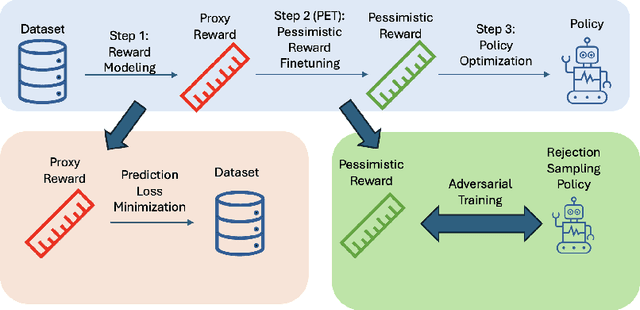


Abstract:This work proposes `PET', a novel pessimistic reward fine-tuning method, to learn a pessimistic reward model robust against reward hacking in offline reinforcement learning from human feedback (RLHF). Traditional reward modeling techniques in RLHF train an imperfect reward model, on which a KL regularization plays a pivotal role in mitigating reward hacking when optimizing a policy. Such an intuition-based method still suffers from reward hacking, and the policies with large KL divergence from the dataset distribution are excluded during learning. In contrast, we show that when optimizing a policy on a pessimistic reward model fine-tuned through PET, reward hacking can be prevented without relying on any regularization. We test our methods on the standard TL;DR summarization dataset. We find that one can learn a high-quality policy on our pessimistic reward without using any regularization. Such a policy has a high KL divergence from the dataset distribution while having high performance in practice. In summary, our work shows the feasibility of learning a pessimistic reward model against reward hacking. The agent can greedily search for the policy with a high pessimistic reward without suffering from reward hacking.
SATBench: Benchmarking LLMs' Logical Reasoning via Automated Puzzle Generation from SAT Formulas
May 20, 2025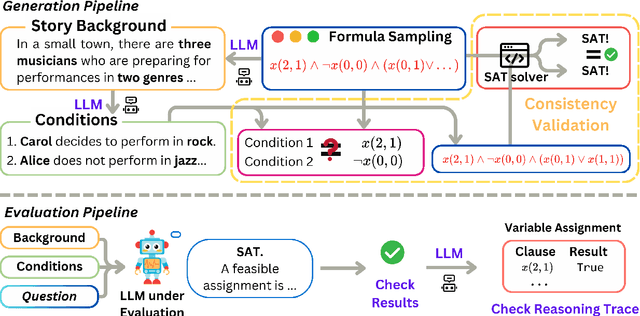
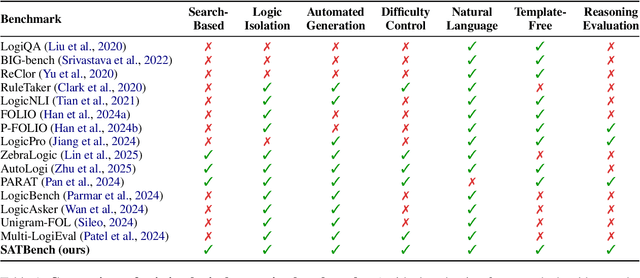

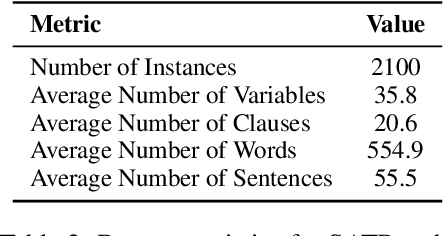
Abstract:We introduce SATBench, a benchmark for evaluating the logical reasoning capabilities of large language models (LLMs) through logical puzzles derived from Boolean satisfiability (SAT) problems. Unlike prior work that focuses on inference rule-based reasoning, which often involves deducing conclusions from a set of premises, our approach leverages the search-based nature of SAT problems, where the objective is to find a solution that fulfills a specified set of logical constraints. Each instance in SATBench is generated from a SAT formula, then translated into a story context and conditions using LLMs. The generation process is fully automated and allows for adjustable difficulty by varying the number of clauses. All 2100 puzzles are validated through both LLM-assisted and solver-based consistency checks, with human validation on a subset. Experimental results show that even the strongest model, o4-mini, achieves only 65.0% accuracy on hard UNSAT problems, close to the random baseline of 50%. SATBench exposes fundamental limitations in the search-based logical reasoning abilities of current LLMs and provides a scalable testbed for future research in logical reasoning.
Improving Assembly Code Performance with Large Language Models via Reinforcement Learning
May 16, 2025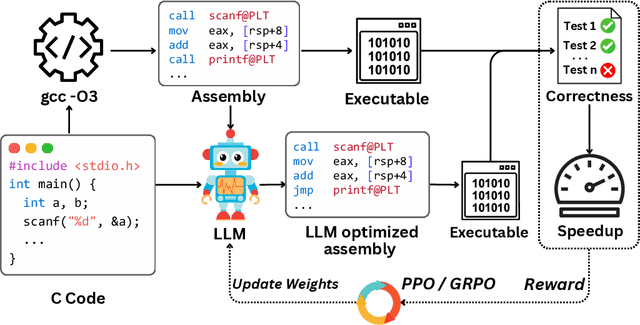



Abstract:Large language models (LLMs) have demonstrated strong performance across a wide range of programming tasks, yet their potential for code optimization remains underexplored. This work investigates whether LLMs can optimize the performance of assembly code, where fine-grained control over execution enables improvements that are difficult to express in high-level languages. We present a reinforcement learning framework that trains LLMs using Proximal Policy Optimization (PPO), guided by a reward function that considers both functional correctness, validated through test cases, and execution performance relative to the industry-standard compiler gcc -O3. To support this study, we introduce a benchmark of 8,072 real-world programs. Our model, Qwen2.5-Coder-7B-PPO, achieves 96.0% test pass rates and an average speedup of 1.47x over the gcc -O3 baseline, outperforming all 20 other models evaluated, including Claude-3.7-sonnet. These results indicate that reinforcement learning can unlock the potential of LLMs to serve as effective optimizers for assembly code performance.
SweRank: Software Issue Localization with Code Ranking
May 07, 2025Abstract:Software issue localization, the task of identifying the precise code locations (files, classes, or functions) relevant to a natural language issue description (e.g., bug report, feature request), is a critical yet time-consuming aspect of software development. While recent LLM-based agentic approaches demonstrate promise, they often incur significant latency and cost due to complex multi-step reasoning and relying on closed-source LLMs. Alternatively, traditional code ranking models, typically optimized for query-to-code or code-to-code retrieval, struggle with the verbose and failure-descriptive nature of issue localization queries. To bridge this gap, we introduce SweRank, an efficient and effective retrieve-and-rerank framework for software issue localization. To facilitate training, we construct SweLoc, a large-scale dataset curated from public GitHub repositories, featuring real-world issue descriptions paired with corresponding code modifications. Empirical results on SWE-Bench-Lite and LocBench show that SweRank achieves state-of-the-art performance, outperforming both prior ranking models and costly agent-based systems using closed-source LLMs like Claude-3.5. Further, we demonstrate SweLoc's utility in enhancing various existing retriever and reranker models for issue localization, establishing the dataset as a valuable resource for the community.
VeriCoder: Enhancing LLM-Based RTL Code Generation through Functional Correctness Validation
Apr 22, 2025
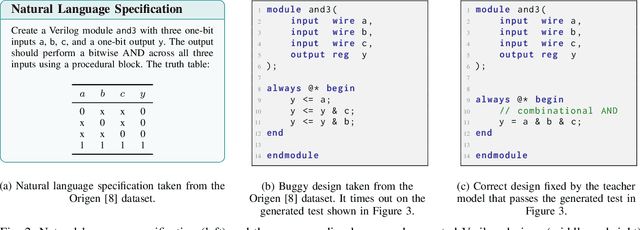
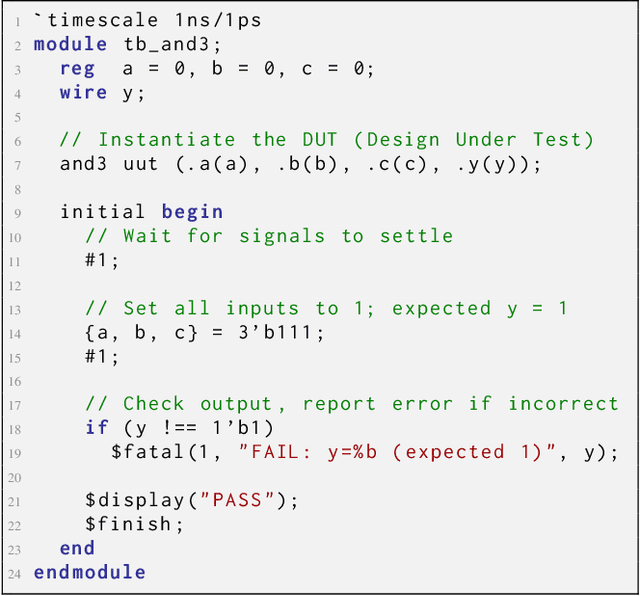
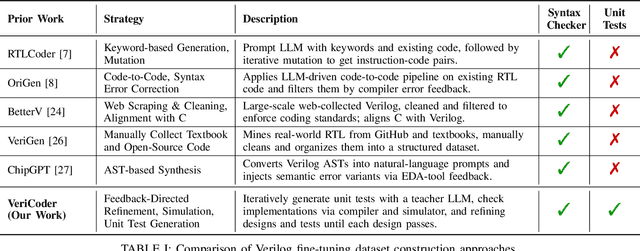
Abstract:Recent advances in Large Language Models (LLMs) have sparked growing interest in applying them to Electronic Design Automation (EDA) tasks, particularly Register Transfer Level (RTL) code generation. While several RTL datasets have been introduced, most focus on syntactic validity rather than functional validation with tests, leading to training examples that compile but may not implement the intended behavior. We present VERICODER, a model for RTL code generation fine-tuned on a dataset validated for functional correctness. This fine-tuning dataset is constructed using a novel methodology that combines unit test generation with feedback-directed refinement. Given a natural language specification and an initial RTL design, we prompt a teacher model (GPT-4o-mini) to generate unit tests and iteratively revise the RTL design based on its simulation results using the generated tests. If necessary, the teacher model also updates the tests to ensure they comply with the natural language specification. As a result of this process, every example in our dataset is functionally validated, consisting of a natural language description, an RTL implementation, and passing tests. Fine-tuned on this dataset of over 125,000 examples, VERICODER achieves state-of-the-art metrics in functional correctness on VerilogEval and RTLLM, with relative gains of up to 71.7% and 27.4% respectively. An ablation study further shows that models trained on our functionally validated dataset outperform those trained on functionally non-validated datasets, underscoring the importance of high-quality datasets in RTL code generation.
CodeARC: Benchmarking Reasoning Capabilities of LLM Agents for Inductive Program Synthesis
Mar 29, 2025Abstract:Inductive program synthesis, or programming by example, requires synthesizing functions from input-output examples that generalize to unseen inputs. While large language model agents have shown promise in programming tasks guided by natural language, their ability to perform inductive program synthesis is underexplored. Existing evaluation protocols rely on static sets of examples and held-out tests, offering no feedback when synthesized functions are incorrect and failing to reflect real-world scenarios such as reverse engineering. We propose CodeARC, the Code Abstraction and Reasoning Challenge, a new evaluation framework where agents interact with a hidden target function by querying it with new inputs, synthesizing candidate functions, and iteratively refining their solutions using a differential testing oracle. This interactive setting encourages agents to perform function calls and self-correction based on feedback. We construct the first large-scale benchmark for general-purpose inductive program synthesis, featuring 1114 functions. Among 18 models evaluated, o3-mini performs best with a success rate of 52.7%, highlighting the difficulty of this task. Fine-tuning LLaMA-3.1-8B-Instruct on curated synthesis traces yields up to a 31% relative performance gain. CodeARC provides a more realistic and challenging testbed for evaluating LLM-based program synthesis and inductive reasoning.
CRANE: Reasoning with constrained LLM generation
Feb 13, 2025Abstract:Code generation, symbolic math reasoning, and other tasks require LLMs to produce outputs that are both syntactically and semantically correct. Constrained LLM generation is a promising direction to enforce adherence to formal grammar, but prior works have empirically observed that strict enforcement of formal constraints often diminishes the reasoning capabilities of LLMs. In this work, we first provide a theoretical explanation for why constraining LLM outputs to very restrictive grammars that only allow syntactically valid final answers reduces the reasoning capabilities of the model. Second, we demonstrate that by augmenting the output grammar with carefully designed additional rules, it is always possible to preserve the reasoning capabilities of the LLM while ensuring syntactic and semantic correctness in its outputs. Building on these theoretical insights, we propose a reasoning-augmented constrained decoding algorithm, CRANE, which effectively balances the correctness of constrained generation with the flexibility of unconstrained generation. Experiments on multiple open-source LLMs and benchmarks show that CRANE significantly outperforms both state-of-the-art constrained decoding strategies and standard unconstrained decoding, showing up to 10% points accuracy improvement over baselines on challenging symbolic reasoning benchmarks GSM-symbolic and FOLIO.
CoRNStack: High-Quality Contrastive Data for Better Code Ranking
Dec 01, 2024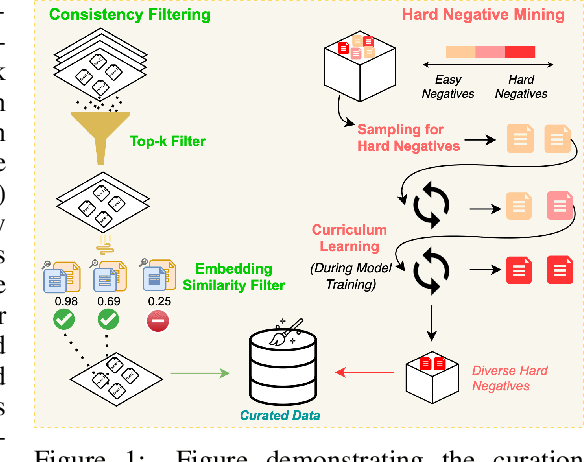
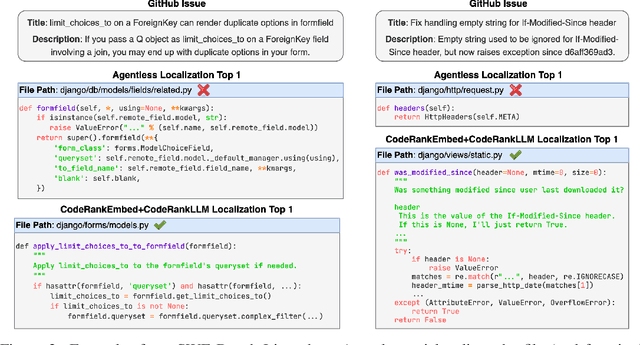
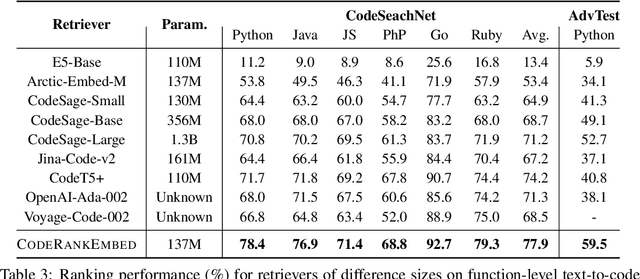
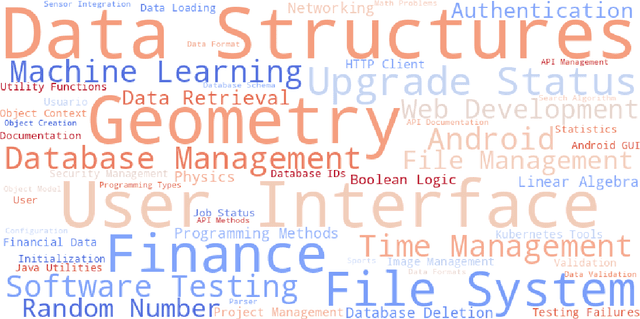
Abstract:Effective code retrieval plays a crucial role in advancing code generation, bug fixing, and software maintenance, particularly as software systems increase in complexity. While current code embedding models have demonstrated promise in retrieving code snippets for small-scale, well-defined tasks, they often underperform in more demanding real-world applications such as bug localization within GitHub repositories. We hypothesize that a key issue is their reliance on noisy and inconsistent datasets for training, which impedes their ability to generalize to more complex retrieval scenarios. To address these limitations, we introduce CoRNStack, a large-scale, high-quality contrastive training dataset for code that spans multiple programming languages. This dataset is curated using consistency filtering to eliminate noisy positives and is further enriched with mined hard negatives, thereby facilitating more effective learning. We demonstrate that contrastive training of embedding models using CoRNStack leads to state-of-the-art performance across a variety of code retrieval tasks. Furthermore, the dataset can be leveraged for training code reranking models, a largely underexplored area compared to text reranking. Our finetuned code reranking model significantly improves the ranking quality over the retrieved results. Finally, by employing our code retriever and reranker together, we demonstrate significant improvements in function localization for GitHub issues, an important component of real-world software development.
 Add to Chrome
Add to Chrome Add to Firefox
Add to Firefox Add to Edge
Add to Edge